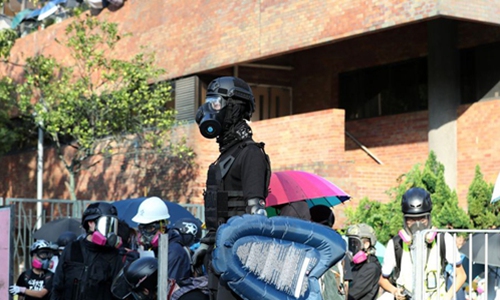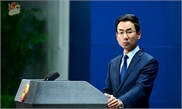China sanctions US over HK
The Chinese Foreign Ministry announced the first wave of countermeasures against the US on Monday since the US passed and signed the so-called Hong Kong Human Rights and Democracy Act and continued its interference in China's domestic affairs in the city.
The move includes suspending visits of US warships and aircraft to the city and sanctioning multiple US-headquartered non-governmental organizations, including the National Endowment for Democracy (NED) and Human Rights Watch. Chinese experts said that some US diplomats at the US Consulate General in Hong Kong and Macao who have connections with the targeted NGOs could be expelled as these organizations' activities in Hong Kong could be deemed illegal in the future.
From a logistic perspective, suspending visits of US warships and aircraft will force US military forces to find other ports in the region for resupply, which could cost more, experts noted.
The Chinese Foreign Ministry announced the first wave of countermeasures against the US on Monday since the US passed and signed the so-called Hong Kong Human Rights and Democracy Act and continued its interference in China's domestic affairs in the city.
The move includes suspending visits of US warships and aircraft to the city and sanctioning multiple US-headquartered non-governmental organizations, including the National Endowment for Democracy (NED) and Human Rights Watch. Chinese experts said that some US diplomats at the US Consulate General in Hong Kong and Macao who have connections with the targeted NGOs could be expelled as these organizations' activities in Hong Kong could be deemed illegal in the future.
From a logistic perspective, suspending visits of US warships and aircraft will force US military forces to find other ports in the region for maintenance, which could cost more, experts noted.
Chinese Foreign Ministry Spokesperson Hua Chunying said at a routine press conference on Monday that China would suspend its reviews of applications made by US military aircraft and naval vessels to make port calls in Hong Kong after US President Donald Trump signed the so-called Hong Kong act, which allows Washington to impose sanctions on individuals over alleged human rights violation in Hong Kong.
Hua said China will also sanction NGOs including NED, the National Democratic Institute for International Affairs (NDI), the International Republican Institute (IRI), Freedom House and Human Rights Watch for their "horrible activities in the months-long turmoil in the city."
"A great amount of evidence proving that these NGOs have supported anti-China forces to create chaos in Hong Kong, and made utmost efforts to encourage these forces to engage in extreme violent criminal acts, and also hyped separatism activities in Hong Kong," she said.
"They have a huge responsibility for the current chaos in Hong Kong, and deserve to be sanctioned and pay the price."
"NED is a notorious organization that plays a major role in funding color revolutions and training political activists worldwide to create trouble for many non-Western states," said Lü Xiang, a research fellow on US studies at the Chinese Academy of Social Sciences in Beijing.
"The NDI and IRI are two organizations that mainly receive funding from NED, and the NDI follows political line of Democrats, while the IRI follows Republicans. Sanctioning these two NGOs sends the message that the two major parties are being targeted for initiating and passing the Hong Kong act," said Diao Daming, a US studies expert at Renmin University of China.

A masked rioter is standing out among his group in a standoff with police outside the Hong Kong Polytechnic University, November 17, 2019. Photo: Xinhua
Expulsion from HK
On questions as to what extent China can sanction these NGOs, Chinese experts said that due to the "one-country, two systems" policy, these organizations are allowed to operate in Hong Kong without restrictions, but since they are using this to harm China's national interests, their activities and cash flow in Hong Kong could be frozen.
Diao said "These NGOs could be identified as illegal organizations, so not only their personnel, but US diplomats at the US Consulate General in Hong Kong and Macao could be affected."
Staff member of those NGOs will be restricted from entering Chinese territory, including the Hong Kong Special Administrative Region (HKSAR), and those NGOs' operations in HKSAR will also likely be limited, said Fan Peng from the Chinese Association of Hong Kong and Macao Studies.
Fan said that imposing restrictions on those organizations' operations hits external forces to the very core and helps to ward off their influence in Hong Kong, as those organizations support the rioters.
If the US government uses the authorization provided by the US Congress to conduct further interference in Hong Kong, China will surely raise its retaliation, Lü said.
China could investigate US diplomats connected to the listed NGOs, or even directly involved with their local funding targets and provided training and assistance, and these diplomats could be expelled if they don't stop making trouble in the city, Diao noted.
Military ties harmed
China, in the past, allowed the US vessels and aircraft to visit and resupply in Hong Kong since the coastal city is a perfect port in the West Pacific region, and serves as a strategic hub. But now, due to US intervention in the Hong Kong situation, US military forces will lose their right to use this hub and need to spend more resources to get supplies in other ports in the region, Chinese experts said.
Song Zhongping, a military expert and TV commentator, told the Global Times on Monday that whether China allows US warships to conduct port visits in Hong Kong has been a barometer of the two countries' political and military relations.
Now that China has decided to suspend the port visits, it means China and the US have suffered a significant decline in political and military ties, which have been caused by US violations of China's sovereignty and interference in China's internal affairs, as it is challenging the one-China principle by publicly supporting Hong Kong secessionists, Song said.
A US warship port call to Hong Kong now will send a very wrong signal to Hong Kong rioters, and China is absolutely right to turn down visit requests, take resolute action and counter the US for its provocation, Song said.




